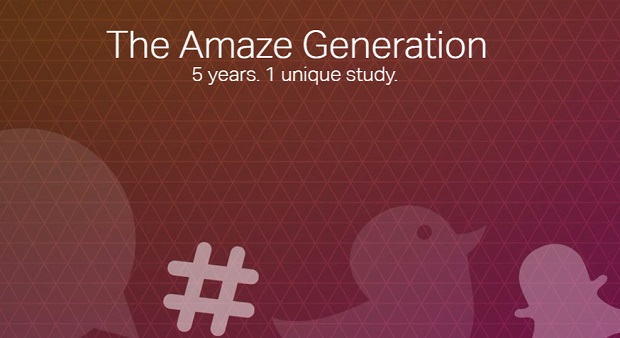The next generation of digital natives see social media as a way to ‘build personal brands’ and prefer quality online relationships rather than a mass of followers, according to the results of an extensive five year study of 10-15 year olds.
The findings, from digital marketing, technology and commerce consultancy, Amaze, form part of a unique, longitudinal ‘Amaze Generation’ study, which has followed a group of 10 – 15 year olds over the past five years, on an up close and personal journey through their digital lives.
Initially conceived in 2011, the Amaze Generation Project – the first of its kind – set out to track how ever-changing technology has influenced the lives of these digital natives and observe how five years’ immersion in a digital landscape has shaped their behaviours and attitudes as they move into further education, work and relationships.
The past five years – and especially the final round of interviews – have shown a clear progression in the Amaze Generation’s attitudes and behaviours. As the participants have matured, they have developed processes and strategies to deal with the digital world around them. These affect every part of their lives, from relationships to self-esteem, careers and education to pastimes and shopping.
Amaze has also assessed how the digital natives’ behaviours and strategies affects brands, for example, brands can’t have a single view of their customer because the ‘Amaze Generation’ have fragmented identities and have no single view of themselves.
The key findings can be summarised as follows:
1. Fragmented identities and the digital driving seat
The Amaze Generation are not selfie-obsessed digital conformists. Digital is not shaping their world. They are shaping it. They manage it and mould it, developing strategies to get the most out of every platform while minimising the risk of negative feedback. They are the ones in the digital driving seat.
As such, they have become adept at fragmenting their identities, cultivating multiple digital selves depending on the platforms used and the result they want to elicit from sharing their content.
2. Building personal brands through social media
The Amaze Generation are digital strategists and content editors – even if they don’t know it. While they may be actively seeking more real experiences online, they have learned to be extremely calculated in how they present their personal brand, creating strict strategies around how, when and where they are seen.
Aware of the tension between their current social media presence (a reflection of the present) and their digital footprint (a reflection of the past), they edit timelines and delete online histories to create better, up-to-date impressions.
3. Friends and followers: balancing open and closed networks
There has been a clear shift in how relationships are viewed. Once, the aim was to collect followers as a form of peer validation. While followers and likes still matter (hence the Amaze Generation maintaining some open networks) there is a greater understanding that social media friendships do not necessarily equate to real friendships. The Amaze Generation are, therefore, placing an emphasis on finding positive experiences on closed, intimate networks of real friends.
This balancing act between open and intimate is one they appear comfortable with, as they adapt content rather than security preferences to stay active online, yet a dichotomy remains between the ongoing need for validation and a desire for more control and privacy.
4. The enduring impact of digital on the real world
In education, the way the Amaze Generation are using digital is helping them find (and occasionally copy) answers, make life changing decisions about whether to attend university, and find the people and tips to help them settle into new careers or university lives.
In retail, buying via mobile and waiting a day for delivery is preferred to instore shopping, with reasons ranging from not wishing to waste time, to not wanting to be around other people.
5. A bright vision of the future
From access to information to mobile shopping, study groups to social interaction, the view the Amaze Generation have of the world is largely upbeat and positive. The participants seek out positive experiences on and offline, and employ personalised strategies to avoid negative experiences. There is a sense of being at the start of an exciting journey or phase in their lives and they hold the view that the digital world already does, and will continue to, enable them to progress.
They seem equipped with strategies to make the digital world work for them as they recognise that if not managed appropriately, there are negative aspects to being ‘always on’.
Alex Comyn, Strategy Director at Amaze comments: “The relationship between technology and human behaviour has always been at the core of everything we do at Amaze.
“Our fascination with understanding our digital world led us, in 2011, to ask one simple question; if you were to track a group of young people for several years, would you be able to see the impact of technology upon them? Would it change them? And if so, how?
“The results have consistently shown us that this Amaze Generation continue to confound every expectation and stereotype we throw at them. They are an intriguing mix of contradictions, fracturing identities, creating personae, editing their personal brands and developing strategies to shape the digital world to meet their evolving needs. They want validation but not intrusion; constant communication but real and intimate networks; platforms that inform, inspire and enable. And they want it all now.
“Even more importantly, they simply refuse to be ‘sold to’. They know what they want, and woe betide the brands that fail to deliver, because they also know how to customise and adapt the digital platforms around them to deliver what others don’t.
“The message for brands is clear: keep up or face the consequences.”
View a video from 5 years ago showing the subject’s first interviews:

